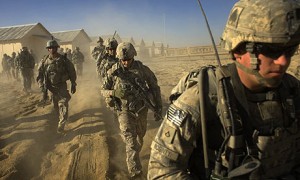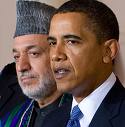The Latest from Iran (19 May): Fallout
 Wednesday, May 19, 2010 at 18:57
Wednesday, May 19, 2010 at 18:57  2035 GMT: The Uranium Sideshow. President Obama issued a boiler-plate, stay-the-course statement at a press conference alongside President Felipe Calderon of Mexico (which happens to have a non-permanent seat on the UN Security Council):
2035 GMT: The Uranium Sideshow. President Obama issued a boiler-plate, stay-the-course statement at a press conference alongside President Felipe Calderon of Mexico (which happens to have a non-permanent seat on the UN Security Council):"[We agree] on the need for Iran to uphold its international obligations or face increased sanctions and pressure, including UN sanctions. And I'm pleased that we've reached an agreement with our P5-plus-1 partners on a strong resolution that we now have shared with our Security Council partners.
Obama did not mention, for he was not asked, why he had encouraged Turkey to pursue talks with Iran leading to the uranium swap agreement in Tehran on Monday.
1845 GMT:Political Prisoner Watch. Housewife Masoumeh Yavari has been given a seven-year jail term at Rajai-Shahr Prison in Karaj. Yavari had been accused of "mohareb" (war against God), and the prosecutor had asked for the death penalty.
Zahra Jabbari, married and the mother of one child, has been sentenced to 4 years in prison. Jabbari was arrested during Qods Day protests on 18 September.
Student Activist Mohammad Yousef Rashidi has been handed a one-year jail term.
NEW Iran’s Uranium: Why Can’t the US Take Yes for an Answer? (Parsi)
NEW Iran’s Uranium: Washington “Can’t Afford to Look Ridiculous”, Makes Ridiculous Move (Emery)
NEW Iran’s Uranium: US Shows a Middle Finger to Tehran…and Turkey and Brazil and… (Gary Sick)
NEW Iran Document: Iranian Labour Unions “This is Not 1979″
Iran Analysis: Washington and the Tehran Nuclear Deal (Parsi)
Iran Alert: Filmmaker Firouz Faces Deportation From UK
Iran Analysis: The Contest at Home Over (and Beyond) the Uranium Agreement (Zahra)
Iran Analysis: Assessing the Tehran Nuclear Deal (Gary Sick)
The Latest from Iran (18 May): Getting Beyond the Uranium Agreement
1700 GMT: Political Prisoner Watch. The Revolutionary Court in Tehran has sentenced student and women's rights activist Bahareh Hedayat to 9 ½ years in prison: six months for insulting the president, two years for insulting the Leader, five years for anti-state and anti-national security actions, and two years, previously suspended, for organizing a gathering in June 2006.
Milad Asadi, another senior member of the alumni organisation Advar-e Tahkim Vahdat, has been sentenced to 7 years in prison.
Bahareh Hedayat's statement for Iran's National Student Day in December 2009:
[youtube]http://www.youtube.com/watch?v=EtUvxtH00Lc[/youtube]
1200 GMT: The Uranium Battle. Ali Akbar Salehi, the head of Iran's atomic energy agency, has issued the highest-level reaction to the US pursuit of a sanctions resolution at the United Nations, "They won't prevail and by pursuing the passing of a new resolution they are discrediting themselves in public opinion."
0940 GMT: Political Prisoner Watch. Masoud Heidari, the former head of the Iranian Labour News Agency,was released from prison on Tuesday. On Sunday, Heidari had begun serving a three-month prison sentence.
0840 GMT: Alice-in-Wonderland Media Statement of Day. I guess the editors of The New York Times have not paid any attention to the events of the last 72 hours:
Brazil and Turkey should join the other major players and vote for the Security Council resolution. Even before that, they should go back to Tehran and press the mullahs to make a credible compromise and begin serious negotiations.
0830 GMT: Political Prisoner Watch. Tahereh Saeedi, the wife of detained film director Jafar Panahi, has told Rah-e-Sabz that her husband has been on hunger strike since Sunday.
Panahi has demanded access to his lawyer, visits by his family, and an unconditional release until a court hearing is held.
Six journalists and cultural activists --- Mahnaz Karimi, Hafez Sardarpour, Mehdi Zeynali, Nader Azizi, Mustafa Jamshidi, and Ramin Jabbari --- were arrested on Monday in Iranian Azerbaijan.
0820 GMT: Shutting Down the Inquiry. Parleman News writes that a reformist proposal to investigate Iran's prisons has been rejected by the Parliament. Speaker of Parliament Ali Larijani insists that the Majlis continues to observe prisons and has forwarded a report to the National Security Council.
0815 GMT: Claim of Day (No, It's Not about Uranium). Rah-e-Sabz claims new accusations of impropriety against Mohammad Javad Larijani, a high-ranking official in the judiciary. The website asserts that a deal has been struck: Ahmadinejad will not press a corruption case against Larijani, while the official and his powerful brothers will drop charges against First Vice President Mohammad Reza Rahimi.
0810 GMT: And There's Always a "Terrorism" Story. Press TV features a summary of its interview with Abdolmalek Rigi, the captured leader of the Baluch insurgent group Jundullah: "While in Morocco, suspected Israeli or US agents had given him a list of people to assassinate in Tehran."
0755 GMT: Evaluating the Uranium/Sanctions Story. We have three analyses of the US response to the Iran-Brazil-Turkey agreement: Trita Parsi asks why Washington cannot take Yes for an answer, Chris Emery suggests it is because the US feels it "cannot afford to look ridiculous", and Gary Sick thinks Washington just showed the middle finger not only to Tehran but to Turkey, Brazil, and a lot of other countries.
The Washington Post has posted a copy of the sanctions resolution introduced by the US into the United Nations Security Council.
0635 GMT: Nuclear Spin of Day. Peyke Iran tries an different angle to attack the Iran-Brazil-Turkey agreement. The website claims that Turkish Prime Minister Recep Tayyip is angry about his reception in Tehran: he and Brazilian President Luiz Inacio Lula da Silva were offered an Iranian breakfast of sangak bread, Bulgarian white cheese, walnuts, and inferior dried fruit.
0630 GMT: Mousavi's Bodyguard. More manoeuvring over Monday's arrest of Mir Hossein Mousavi's head of security, Ahmad Yazdanfar. Khabar Online claims that Yazdanfar "withdrew" from his position, and the story that he was detained is a fiction of the "leaders of sedition" and foreign media.
Opposition outlets have responded that Yazdanfar is not "political" at all but a simple security officer. Through his arrest and the kidnapping, terror, and torture of others, the Government is slowly becoming a terrorist group.
0615 GMT: Iran's Debate on the Tehran Deal. The Government is still facing some opposition to the Iran-Brazil-Turkey agreement. From the conservative wing, Ahmad Tavakoli (and possibly, through indirect means, Speaker of Parliament Ali Larijani) made challenges on Tuesday. On the reformist side, Darius Ghanbari asked why Iran had waited seven months and expended so much capital in its foreign policy, only to move towards an agreement it could have had in October.
The response of pro-Government politicians is that this is only a "declaration", not a "treaty", so Tehran has not entered any binding commitments. Or, as Foreign Minister Manouchehr Mottaki said, "If the Vienna Group (US, UK, France, Germany, Russia, China) accepts Iran’s terms and conditions...both parties commit themselves to the implementation” of the deal."
(Which means that Washington's response --- throwing out any consideration of the agreement in favour of a sanctions-first approach --- has sheltered the Ahmadinejad Government against its internal opponents.)
0530 GMT: For many observers, the nuclear sideshow will remain the main event today. The Obama Administration pretty much guaranteed that when, despite the Iran-Brazil-Turkey agreement on a procedure for a uranium enrichment deal (and despite the small fact that President Obama appears to have encouraged the Turks to pursue the deal --- more on that later), Secretary of State Hillary Clinton loudly and not very politely announced that the US was proceeding with a sanctions resolution in the United Nations.
The resolution was submitted in the late afternoon, so now we will be treated to a lot of posturing on all sides, possibly obscuring this bottom-line assessment, courtesy of the National Iranian American Council: "This is an unbelievably stupid move on the part of the Obama administration. Not only are we rejecting our own terms of the agreement, but we are doing so in as tactless and diplomatically insulting way possible."
Meanwhile, on the centre stage of Iranian politics....
Containing Mousavi
Muhammad Sahimi offers a concise summary of the latest steps by the Government to intimidate Mir Hossein Mousavi ahead of the election anniversary on 12 June, including the arrest of Mousavi's top bodyguard.
The Labour Front
We have posted, in a separate entry, the statement of the Network of Iranian Labor Unions setting out its view of opposition to the Government, "This is Not 1979".
Iran Labor Report posts an overview of recent workers' protests.
 Abdolmalek Rigi,
Abdolmalek Rigi,  Advar-e Takhim Vahdat,
Advar-e Takhim Vahdat,  Ahmad Tavakoli,
Ahmad Tavakoli,  Ahmad Yazdanfar,
Ahmad Yazdanfar,  Ali Akbar Salehi,
Ali Akbar Salehi,  Ali Larijani,
Ali Larijani,  Bahareh Hedayat,
Bahareh Hedayat,  Barack Obama,
Barack Obama,  Brazil,
Brazil,  Darius Ghanbari,
Darius Ghanbari,  Felipe Calderon,
Felipe Calderon,  Hafez Sardarpour,
Hafez Sardarpour,  Hillary Clinton,
Hillary Clinton,  Iran,
Iran,  Iran Elections 2009,
Iran Elections 2009,  Iran Labor Report,
Iran Labor Report,  Iranian Labour News Agency,
Iranian Labour News Agency,  Jundullah,
Jundullah,  Khabar Online,
Khabar Online,  Luiz Inacio Lula da Silva,
Luiz Inacio Lula da Silva,  Mahnaz Karimi,
Mahnaz Karimi,  Manouchehr Mottaki,
Manouchehr Mottaki,  Masoud Heidari,
Masoud Heidari,  Masoumeh Yavari,
Masoumeh Yavari,  Mehdi Zeynali,
Mehdi Zeynali,  Mexico,
Mexico,  Milan Asadi,
Milan Asadi,  Mir Hossein Mousavi,
Mir Hossein Mousavi,  Mohammad Ahmadinejad,
Mohammad Ahmadinejad,  Mohammad Javad Larijani,
Mohammad Javad Larijani,  Mohammad Reza Rahimi,
Mohammad Reza Rahimi,  Mohammad Yousef Rashidi,
Mohammad Yousef Rashidi,  Muhammad Sahimi,
Muhammad Sahimi,  Mustafa Jamshidi,
Mustafa Jamshidi,  Nader Azizi,
Nader Azizi,  National Iranian-American Council,
National Iranian-American Council,  Network of Iranian Labor Unions,
Network of Iranian Labor Unions,  New York Times,
New York Times,  Parleman News,
Parleman News,  Peyke Iran,
Peyke Iran,  Press TV,
Press TV,  Rah-e-Sabz,
Rah-e-Sabz,  Ramin Jabbari,
Ramin Jabbari,  Recep Tayyip Erdogan,
Recep Tayyip Erdogan,  Tahareh Saeedi,
Tahareh Saeedi,  Turkey,
Turkey,  United Nations,
United Nations,  United Nations Security Council,
United Nations Security Council,  Vienna Group,
Vienna Group,  Washington Post,
Washington Post,  Zahra Jabbari,
Zahra Jabbari,  uranium enrichment in
uranium enrichment in  Middle East & Iran
Middle East & Iran 



